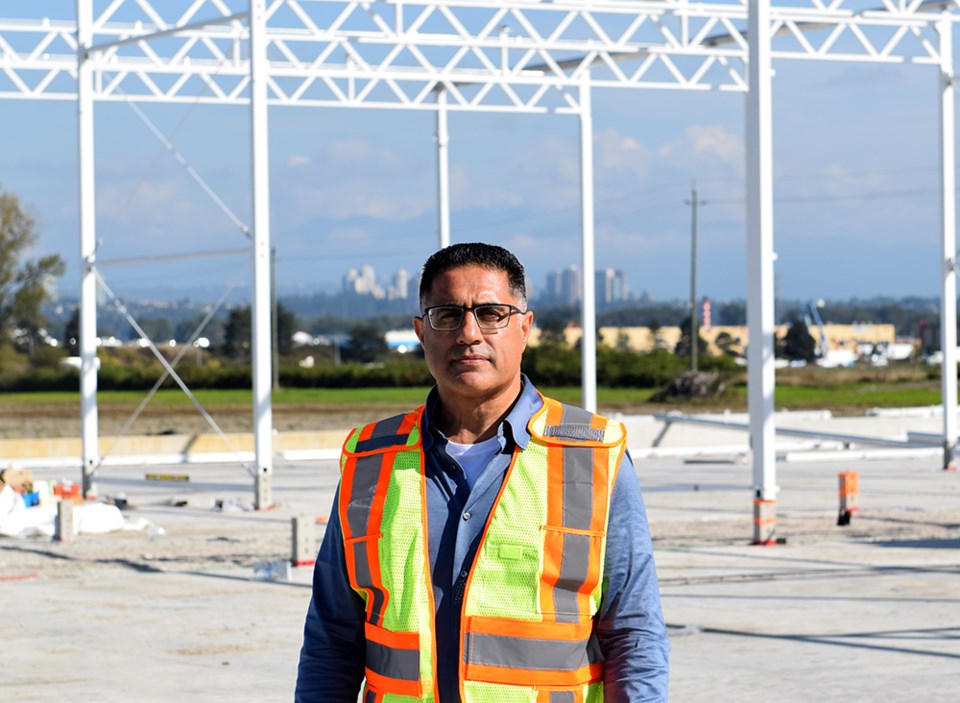A controversial outdoor cannabis grow area in Richmond has received its cultivation licence from Health Canada, allowing it to move ahead with crop production.
The licence, which came into effect July 12, allows Emerald Health Therapeutics to grow and harvest cannabis crops at its 12-acre outdoor cultivation area.
The outdoor area is part of a larger 20-acre site, which features two greenhouses, located in the city’s Agricultural Land Reserve near No. 9 Road and Westminster Highway.
According to the company, the area is capable of producing up to 10,000 kg of cannabis each year, with multiple crops throughout the growing season. Emerald expects that the Richmond operation will be able to deliver one full harvest this year, although that will only be a portion of full production volume.
Dr. Avtar Dhillon, Emerald’s president, began constructing the two greenhouses and an electrical building on the property in early 2017, but the City of Richmond denied him the building permits and issued a stop work order, suspecting that he might use the greenhouses for medical cannabis production.
In 2003, the city amended its zoning bylaws to forbid medical cannabis production on the ALR, which came into conflict with the province’s May 2015 decision to allow federal medical cannabis production on the ALR.
Last year, the city lost against Emerald, who had initiated the case following the stop work order and permit denial, at B.C. Supreme Court.
In the Aug. 24, 2018 decision, the court found that Richmond’s zoning bylaw was inconsistent with provincial ALR rules, and that the city could not prohibit a farm use that ALR regulations specifically allow.
Since then, the company has been working on ground and seed preparation and is now preparing for planting, said Dhillon.
“As one of the few licensed producers licensed for outdoor growing, receiving this cultivation license highlights our planning and execution to achieve potentially very low-cost organic cannabis,” Dhillion added.
The province did announce, in July 2018, that local and First Nations governments could prohibit cannabis production in the ALR, unless it is grown in ways that preserve the production capacity of agricultural land.
More specifically, the regulation gave local and Indigenous governments the right to prohibit cement-based, industrial-style, cannabis-production bunkers on ALR land, but that these governments could not stop cannabis production in the ALR if cannabis crops were grown in an open field; in a structure with a soil base; in structures fully constructed or under construction prior to the regulation change; or in an existing licensed operation.
When news of the planned construction of Emerald’s facility first broke last year, Coun. Linda McPhail expressed concerns at the time over the size of the buildings as well as matters of security.
For McPhail, security at the site is still a concern, especially given the open nature of the grow area.
But the Richmond city councillor is also concerned about “odour management.”
“We know that (odour) could be an issue for some neighbourhoods,” McPhail said.
This is something fall under the jurisdiction of Metro Vancouver, said McPhail, and the city will be looking to them on how to regulate cannabis emissions.
Metro Vancouver is currently in the first phase of its consultation regarding regulations for cannabis emissions, and expects the second phase to take place in early 2020, according to a spokesperson from the regional body. It’s likely that a regulations proposal won’t be presented to the Metro Vancouver board until late 2020 or early 2021.



